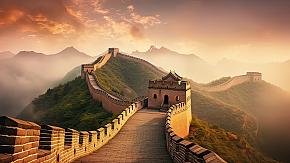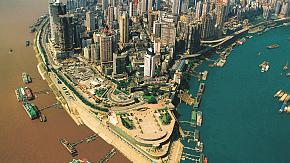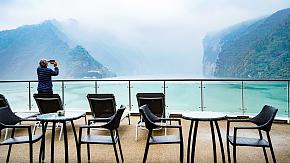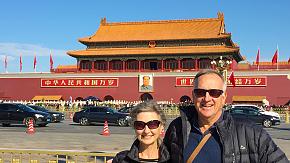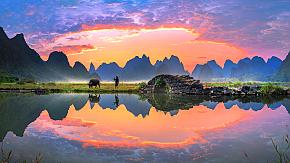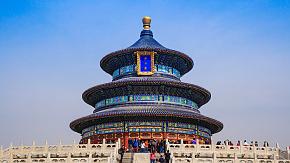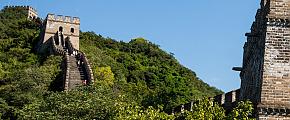Top 15 China Travel Tips - Things to Know Before You Go
Planning a trip to China and traveling throughout the country can be daunting, especially if you've never been there before. To having a lifetime trip, we list the top China travel tips that you need to know before traveling to China.
Quickly get what you need to do to prepare, what to pack, how to plan your China tour, cultural and safety advice, and more.
 Enjoy picturesque Guilin on a bamboo raft
Enjoy picturesque Guilin on a bamboo raft
- Prepare the Travel Documents for Entering China
- VPN: Be Prepared for Internet Restrictions
- Register Account for Mobile Payment
- Take Your Credit Card and Some Cash
- Plan Your Trip 2-3 Months in Advance
- Be Prepared for Crowds During the Peak Season
- Book Your Trip Through a Travel Agency
- Pack Smartly for an Easy Trip to China
- Download Translation Apps
- Trains Are Sometimes More Efficient Than Planes
- Private Cars Are Best for China's City Exploration
- Be Aware of Local Customs and Traditions
- Be Adventurous to Chinese Cuisine
- You May Encounter Squat Toilets
- Tipping Is Not Common in China
1. Prepare the Travel Documents for Entering China
Before traveling to China, ensure you have the necessary travel documents to avoid any issues at the border. The key documents include:
Passport:
Your passport should be valid for at least six months beyond your planned departure date from China.
Visa:
Most travelers need a visa to enter China. You must apply for the visa through a Chinese embassy or ask a travel agency to help you apply for a Port Visa before your trip.
But if you are from any of the 46 countries under the visa-free policy, such as France, Germany, Malaysia, the Netherlands, Singapore, Spain, things will be simpler than ever before, as visa is not required for visits to China of 30 days.
Besides, there is a 240-hour visa-free transit policy, Hainan 30-Day visa-free policy, etc.
For more details please check out: China Travel Documents 2026.
2. VPN: Be Prepared for Internet Restrictions
In China, the overseas websites are blocked, so you can't visit some popular sites and social media platforms like Google, Youtube, Facebook, Twitter, and Instagram in normal circumstances in China.
If you need to use these sites, receive or send an email, it's highly recommended to purchase a VPN. It can make it appear as you are connecting from the US or Australia, even though you are actually in China, by masking the computer's IP address.
3. Register Account for Mobile Payment
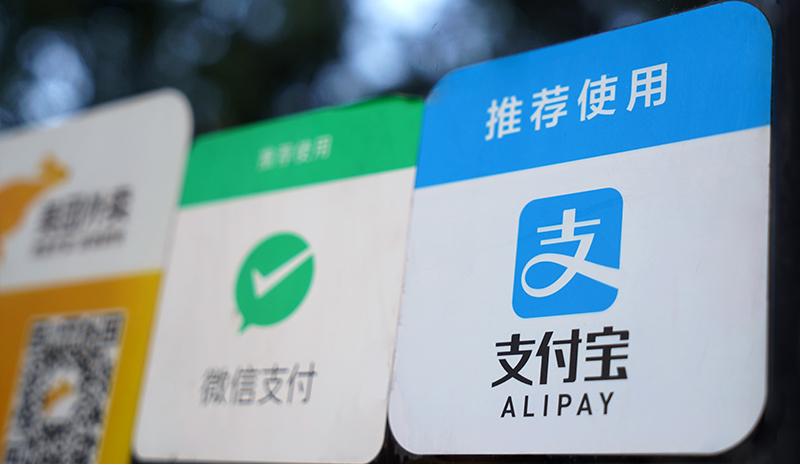 Chinese Ali Pay and WeChat Payment
Chinese Ali Pay and WeChat Payment
As long as you get to China, you can surprisingly find nearly all vendors prepare a collection code for consumers, from the shopping malls to the local markets. That means you can just use a mobile phone to buy everything you want.
If you want to experience the mobile payment in China for convenience, you can register for a Ali Pay or WeChat Pay account before you go. We recommend WeChat Pay more because it simplifies its register process in recent years. To link with WeChat Pay, visitors just need to provide your Visa or MasterCard number, along with the expiration date and security code.
4. Take Your Credit Card and Some Cash
While credit cards and cash are less and less used in most cities of China, using cash or credit card is still available in China. The currency of China is the Chinese yuan (CNY or RMB). It's a good idea to take your credit cards and exchange some currency to allow for emergencies.
If you're planning to add Hong Kong or Taiwan in your China tour, you need to bring 2 extra kinds of currencies, Hong Kong Dollar and New Taiwan Dollar, as these two special administrative regions had issued their own currencies.
5. Plan Your Trip 2-3 Months in Advance
Among the China travel tips, one of the most important is planning your trip 2-3 months in advance. It offers significant advantages, including securing better deals on flights and accommodations, allowing ample time for visa processing, getting your travel items ready, and providing the opportunity to thoroughly research and organize your itinerary.
6. Be Prepared for Crowds During the Peak Season
China's peak travel seasons, such as Chinese New Year (Februrary 17th - March 3rd, 2026), National Day (October 1st - 7th, each year) and the summer holidays from July to August, attract large crowds. Popular tourist destinations can become extremely busy, leading to longer wait times and crowded conditions.
Actually, traveling during the off-peak season, offers a more relaxed experience. However, if you are going to traveling to China during peak seasons, please consider visiting the popular attractions like the Great Wall and Terracotta Warriors early in the morning or later in the day to avoid crowds. Or visit some less crowded sites. And it's important to book tickets and accommodations well in advance.
7. Book Your Trip With Experienced Travel Experts
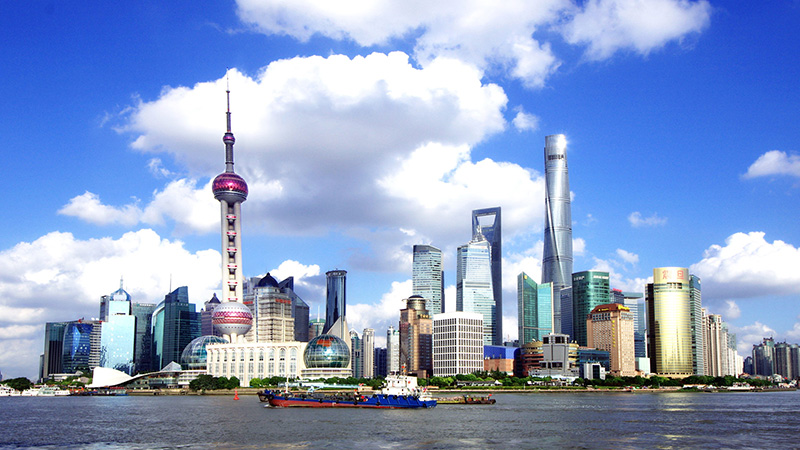 Admire the Bund in Shanghai
Admire the Bund in Shanghai
China is a vast country with a rich cultural heritage and many popular tourist destinations. The variety of tourist attractions will spoil you for choice, so it's important to plan your itinerary carefully to make the most of your time in China. But how? It can be hard to choose where to go and organize the trip, especially when it's the first time you go there.
Here, we're ready to help you creating your travel plan and do the reservation can make the thing much simpler and enhance your travel experience. Our travel experts have experience in customizing China tour itinerary for our clients. They will craft you a personal route that covers the top attractions and hidden gems while navigating the complexities of travel in China at an ease pace. Additionally, we can arrange exclusive support throughout your journey, helping resolve the issues that may arise, which can make your trip stress-free and enjoyable.
8. Pack Smartly for an Easy Trip to China
China's vast size means it has a wide range of climates. Research the weather conditions of the regions you'll be visiting and pack accordingly. Layers are key, as temperatures can vary greatly between cities and even within a single day. Don't forget essentials like a good pair of walking shoes, a hat, sunglasses, and rain gear.
By the way, there's an important thing to know if you carry a power bank on your trip to China. For domestic flights in China, power banks must be under 100Wh. Power banks that made in China need a CCC (China Compulsory Certification); foreign-made ones may be accepted with CE or FCC certification. These rules don't apply to train travel or international flights. If you're not sure whether your power bank is certificated or not, you can simply left it at home and buy a compliant power bank in China.
9. Download Translation Apps to Bridge the Language Gap
Mandarin is the official language of China and English is not widely spoken, especially in rural areas. And even if you book your tour with a travel agency and have a private guide, you may still have some free time to explore the country by yourselves. So, it is necessary to download translation Apps to help you communicate with the locals.
Besides, you may also learn some basic Chinese phrases like "hello" (nǐ hǎo, 你好), "thank you" (xiè xie, 谢谢), "please" (qǐng wèn, 请问), and so on.
10. Trains Are Sometimes More Efficient Than Planes
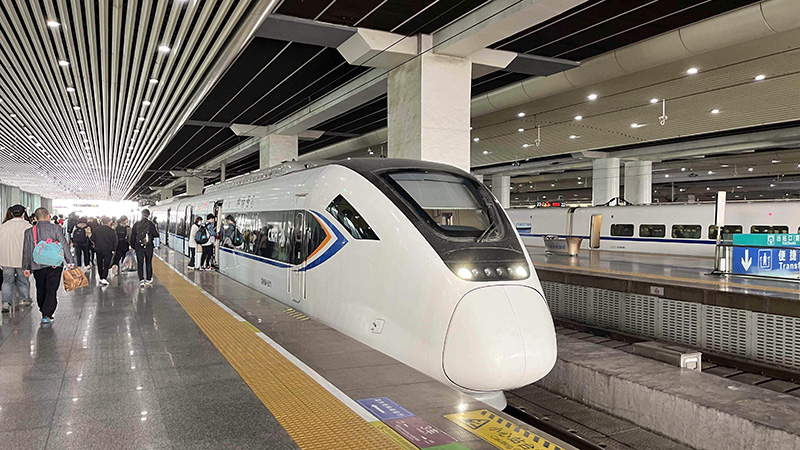 High-Speed Train in China
High-Speed Train in China
For long-distance intercity travel, it's generally advisable to take a domestic flight to save time, such as traveling from Xi'an to Shanghai or from Chengdu to Lhasa. These flights typically take 2 to 3 hours.
However, the railway system in China nearly covers the entire country, making high-speed trains a great option for short-distance intercity travel, like from Beijing to Xi'an or Hong Kong to Guilin. High-speed rail stations are often closer to city centers than airports, and trains travel at speeds ranging from 200 to 350 kilometers per hour (124 to 217 miles per hour). This means that, for shorter trips, a high-speed train can sometimes be faster than a plane. Additionally, while air tickets can be expensive during peak seasons, high-speed rail fares are more affordable and remain constant throughout the year.
11. Private Cars Are Best for China's City Exploration
In China's most tourists cities, the distance of the attractions can be far, such as from the Forbidden City to the Great Wall of China, and it gonna be complicated travel by public transportation. The most convenient way is to have a private car with a seasoned driver with you.
With your luggage safely stowed and the climate controlled to your liking, this way offers a comfortable and private travel experience. Besides, it allows you to craft your own itinerary, stopping at hidden gems and lingering at must-see sights for as long as you desire. If you seek independence and flexibility in your urban adventure, it is perfect for you.
12. Be Aware of Local Customs and Traditions
Understanding and respecting local customs can enhance your travel experience. For example, it's polite to accept items with both hands, avoid pointing with your finger, and show respect when visiting temples, avoid touching people's heads, don't take photos of people without their permission. Additionally, dress modestly when visiting religious or cultural sites.
13. Be Adventurous to Chinese Cuisine
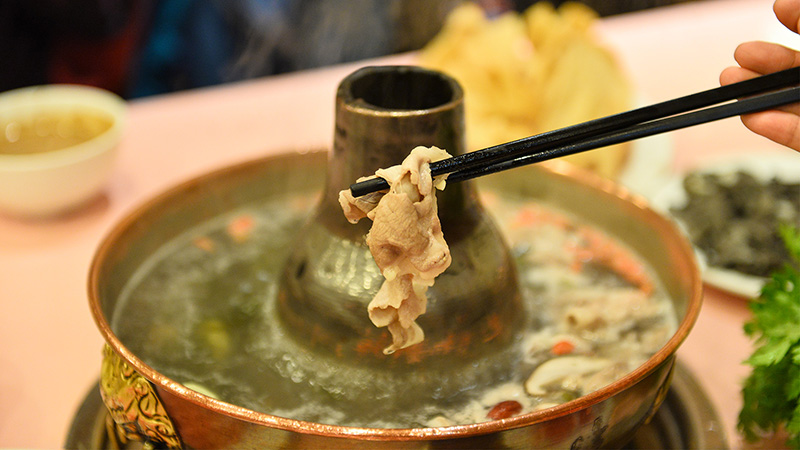 Beijing-Style Hot Pot
Beijing-Style Hot Pot
Chinese cuisine varies greatly from region to region. From the fiery Sichuan hot pot, a simmering cauldron of chilies and numbing Sichuan peppercorns, to the delicate Shanghainese soup dumplings (xiao long bao), filled with flavorful broth, each region boasts unique flavors and iconic dishes. When traveling in China, be adventurous on trying local specialties, you will get more fun.
When it comes to eating in China, one thing that must be mentioned is that chopsticks are the utensil of choice in China, unlike the fork and knife you might be accustomed to. Mastering them can enhance your dining experience, as some dishes can be trickier to navigate without chopstick skills. Consider practicing beforehand for a smoother culinary adventure!
14. You May Encounter Squat Toilets
China is increasingly offering a mix of squat and Western toilets. However, you may still have chances to meet squat toilets, especially in some rural areas. So, you can practice this action in advance: a low, stable squat with feet shoulder-width apart. Relax, breathe deeply, and conquer this new experience! You'll be a China restroom pro in no time. Don't forget to pack some toilet tissues as most public restrooms won't have them.
Don't worry. Most hotels and shopping malls have toilets with Western-style seats.
15. Tipping Is Not Common in China
Unlike the West, tipping in China is generally unexpected. Restaurants might include a service charge, but otherwise a small tip for outstanding service is appreciated. The same goes for hotels if staff go the extra mile. Taxis and other services don't require tipping, but rounding up the fare shows courtesy. Remember, a sincere "xie xie" (thank you) is always the best way to express gratitude.
Plan Your Trip With China Odyssey Tours
By following these China travel tips, your trip will be much smoother. If you have any other questions, please feel free to contact us or reach us at trip@odynovotours.com. We're happy to offer you more information about China and help you create your own itinerary.
What Our Clients Say
"Great Customized Service", "Trip of A Lifetime", "Exceed All Expectations"


